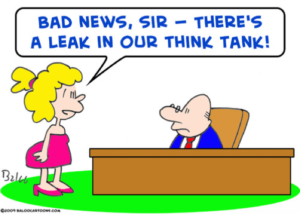Think Tanks, Beliebers, & AOL.com
Here’s What You Need to Know
Two new reports have been released illustrating the importance and influence of third party groups in public affairs campaigns. The Think Tanks and Civil Societies Program at the University of Pennsylvania released their “2015 Global Go To Think Tank Index Report” listing the top think tanks in the U.S. and abroad. The report breaks down the global think tank community by a number of metrics, including each organization’s resources, reputation, quantity of policy proposals, and impact of those policy proposals on policymakers.
Leading the think tank rankings in the U.S. are the Brookings Institution, Carnegie Endowment for International Peace, and the Center for Strategic and International Studies. Also in the top ten were Cato Institute (#6) and the Heritage Foundation (#10). In Western Europe, Chatham House (U.K.), Bruegel (Belgium), and the French Institute for International Relations topped the rankings. World Economic Forum was all the way down the list at #28. So much for the one percent.
Why do these think tank rankings matter? A new study from The Readmond Group, “The Power of Outside Groups in Public Affairs,” shows how third parties like think tanks play a crucial role in large-scale public policy debates. The study demonstrates how outside groups work in an interconnected fashion to achieve their objectives, even when the alliances seem unlikely. From think tanks to advocacy groups to specific ideological pressure groups, the study pulls back the curtain on how coalitions are formed and policies are changed. Clearly, third party groups are worth keeping an eye on.
Subscribe to Receive Insights
"*" indicates required fields
News You Can Use
ALL ABOUT THE NARRATIVE
A new op-doc by media maestro Mark McKinnon, the lead media strategist for George W. Bush’s 2000 and 2004 campaigns as well as John McCain’s 2012 primary campaign, “lays bare the fundamental narrative strategies that remain at the core of today’s presidential campaigns.” It’s a good lesson for all public affairs efforts. Fun fact: Delve CEO Jeff Berkowitz provided research for several of the 2004 ads featured in the film.
CONGRESSIONAL PRODUCTIVITY IN AN ELECTION YEAR?
It’s conventional wisdom that Congress is less productive during election years. The Presidential race is distracting, neither party is invested in accomplishing anything, and neither party wants to take policy positions that may contradict their nominee. However, after crunching the numbers, Quorum discovered that “Congress is more productive in presidential election years than midterm election years.” In fact, out of the last four Congresses, the most productive years were 2008 and 2012. What does this all mean? If you’re looking to maximize your lobbying effort, it might be better to lean in to election years rather than lean out.
BIPARTISAN BELIEBERS
What is perhaps one of the last things left that unites Americans? According to Bloomberg, the answer is Justin Beiber. After mapping the top 25 tracks played by Democrats, Republicans, and Independents on Spotify, Bloomberg discovered “Sorry” and “Love Yourself” appear amongst the top three tracks for all listeners, regardless of party affiliation. What is slightly less surprising? Religious and country music is played at much higher rates by Republicans while Democrats seem to have a thing for Rihanna.
ON THE BRINK OF A BREXIT?
As NPR reports: “Britain’s Prime Minister David Cameron is calling for a historic nationwide referendum on June 23 to decide whether the U.K. will remain in the European Union.” In an attempt to assuage the euro-skeptics prior to calling for the referendum, Cameron negotiated new terms for Britain’s membership with the EU with European leaders last Friday. Cameron considers the deal a success, but others aren’t so sure. A poll of polls prior to the negotiations revealed that 52% of voters were in the “remain” camp and 48% wanted to leave, and, the BBC reports, “Critics argue that the final deal falls well short of what Mr. Cameron originally promised when he announced his plan for a referendum, particularly when it comes to returning powers from Brussels.”
MILLENNIAL MESSAGING
In a recent interview, author of “The Selfie Vote” and GOP pollster Kristen Soltis Anderson discussed the party’s young voter gap and how politicians can best communicate their message to millennials. What’s her advice to candidates? “Part of what I tell them is to always think about the way the stuff they stand for will actually affect someone’s day-to-day life.”
AOL.$$$.COM
USA Today reports, “A January study by digital marketing firm Fluent concluded that only 4% of subscribers to political email lists had AOL.com email addresses, while 48% of subscribers had Gmail accounts. But those AOL users accounted for 22% of total donations during the study period — November and December 2015 — with an average donation of $159. Gmail users accounted for only 13% of donations with an average gift of $31.” Why? Older people are more generous and they’re more likely to have an AOL account.
BRAG FOR VOTES
“Busting balls” might just be the new way to become President. With working class appeal, Trump has invented a new way to win. As Mark Cunningham writes for the New York Post, “From the start, Trump targeted the (mostly) white working class, which happens to be 40 percent of the country. And he’s done it not just with issues, but with how he talks — the ball-busting, the ‘bragging,’ the over-the-top promises.” What’s more, Trump doubles on his promises. He’s not just going to build a wall but also make Mexico pay. “Politicians never deliver everything they promise, but the higher they aim, the more likely you’ll actually get something.” No, Trump isn’t playing by the rules. And judging by his poll numbers, voters don’t want him to.
ZENE-FAIL
The HR software startup and former venture capital darling, Zenefits, is now facing a series of hurdles brought on by attempts to circumvent California’s insurance broker regulations. Ben Thompson of Stratechery uses a recent blog post to outline how Zenefits’ actions may have been emblematic of poor judgment, but, “regulations are one of the most effective moats [industry] incumbents have because they already have the infrastructure and revenue streams to deal with them.” Any tech startup entering a highly regulated industry must be ready to face this inevitable challenge.
AIRCRAFT CARRIER ANTIQUATION
American global military supremacy has always relied heavily on the rapid deterrent offered by aircraft carriers, however a recent report by the left-leaning Center for a New American Security suggests other major players on the international stage have begun to adjust their military forces to counter American dominance. The report explains, “In recent years, a number of countries, including China, Russia, and Iran, have accelerated investments in anti-access/area denial (A2/AD) capabilities such as advanced air defense systems, anti-ship cruise and ballistic missiles, submarines, and aircraft carriers.” The report concludes that in order to maintain supremacy the American military must reevaluate its use of carriers and innovate its thinking for future operations.
Mark Your Calendars
February 25 – CNN GOP Debate
February 27 – South Carolina Democratic Primary
March 1 – Super Tuesday: Alabama, Arkansas, Colorado, Georgia, Massachusetts, Minnesota, Oklahoma, Texas, Vermont and Virginia; GOP only: Tennessee primary and Alaska caucus
Subscribe here to get TL;DR in you inbox each week.



